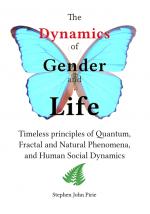TL;DR
- A holo-dynamic system is a participatory, creative self-organising system in which choice is fundamental, such that each part, including all people and particles1, co-create our experienced reality.
- The universe is a non-locally interconnected, interdependent, creative, self-organising sentience (SOS) in which perceived divisions into autonomous, separate, independent states (e.g. heaven, hell, perfection) are limited perceptions within a greater 'wholeness'2.
The term holo-dynamic system is (in my opinion) a more descriptive understanding of "holomovement" — a term coined by the late physicist, David Bohm. Bohm used the term holomovement to more accurately describe the inherent holographic nature of reality.
With the theoretical and experimental proof of nonlocality, we now know (as Prof. Victor Mansfield explained) we exist within " a radically interconnected and interdependent" world, and universe. And that each particle, person and planet are interconnected, and interacting at-once, nonlocally. As physicist Nick Herbert explained, these immediate interactions are "present not only in rare and exotic circumstances, but underlie all the events of everyday life."
As Bohm correctly noted, the universe is NOT static like a holographic image. It is in motion, in constant state of flux and interacting — hence the appropriateness of the term 'holomovement'.
"Holodynamic system" goes further, with the 'dynamic' aspect implying it is also expansive and creative. This follows from recognising that the concept of the "infinite" is not a static 'thing' that can be described, or assigned a symbol and conveniently written on a piece of paper, or put in some equation. The infinite is a process, of always expanding beyond 'itself'. The infinite is dynamic. Putting all that together, a holodynamic system (in which everything, everyone and every dimension or state) is interacting, at-once, while also growing and expanding beyond 'itself'.
The holo aspect means that the process of the universe must also be the essential process of life — of learning and growing beyond oneself, of being dynamic, creative, evolving. And this process occurs (in respect of the holo aspect) all the way down, all the way up; all the way back (in time) and forward. In other words, as within the part, so within the whole, and vice versa.
Interestingly, all the major religious and spiritual traditions have (at least originally, historically) espoused a (rudimentary) understanding of the holodynamic nature of reality. However the following statements are all expressed in static terms — typically the source (God or Brahman etc3) is believed to be unchanging, perfect, absolute.4 This fundamentalism reflects how various religions and spiritual traditions have failed to capture the dynamic, interactive and creative nature of reality.
- Hinduism "By understanding the Self, all this universe is known" (Upanishads);
- Islam, "He who knows himself knows his lord," (Muhammad);
- Confucianism, "Heaven, earth and human are of one body";
- Zen Buddhism, "Look within, you are the Buddha";
- Christianity, "The Kingdom of God is within you";
- Jewish Kabbalah, "if one contemplates things in mystical meditation, everything is revealed as one."
That religions and spiritual traditions failed to grasp or espouse the creative nature is to be expected, given the historical nature of religious belief. As Rev. John Shelby Spong observed "Religion ... was for most of human history, always childlike and by definition authoritarian. It was, to be specific, a primary activity of the childhood of our humanity as a species." More explained in "The Evolution of the Human Psyche".
In our recent times (within the last 80 or so years) the science of quantum physics has been providing us a fuller understanding of our cosmos, and of ourselves. As Max Born, one of the founders of quantum theory explained, "I am now convinced that theoretical physics is actual philosophy".
This "actual philosophy" has led many leading physicists to echo world-views strikingly similar to ancient spiritual traditions, but with one additional, and highly important qualification: as physicist John Wheeler explained, we live within a participatory universe, in that it is newly forming (including our past, newly forming all the way back to the Big-Bang). We each contribute to the ongoing creation of not just the present and the future but the past as well. As we think, we create; as we grow, the universe, and God grows. As we learn, God learns, the universe expands.
- 1. “consciousness is not just a passive epiphenomenon carried along by the chemical events in our brains, but is an active agent forcing the molecular complexes to make choices between one quantum state and another.
In other words, mind is already inherent in every electron, and the processes of human consciousness differ only in degree but not in kind from the processes of choice between quantum states which we call ‘chance’ when they are made by electrons.” [Freeman Dyson, Disturbing the universe] - 2. "If my conclusions are correct, each individual is part of God or part of the Universal Mind. I use the phrase “part of” with hesitation, recalling its looseness and in-applicability even in recent physics. Perhaps a better way to put the matter is to say that each of us is the Universal Mind but inflicted with limitations that obscure all but a tiny fraction of its aspects and properties." [Henry Margenau, The Miracle of Existence]
- 3. in a holodynamic reality, all points, people and realms is source, at every point, with the centre of the universe everywhere. That is, the individual ego is as much the source as God, the whole, all.
- 4. Although it appears comforting to believe in 'perfection', ultimately it is stultifying, repressive and 'heavy'. See "Rest stops in the sky".
